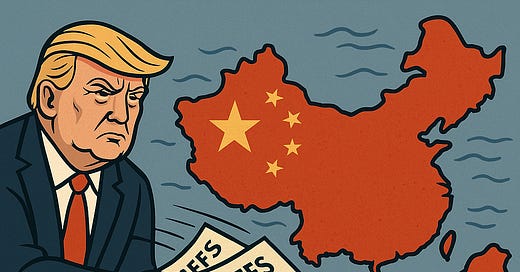Summary
With the world in turmoil—the Russia-Ukraine war still dragging on,Trump launching tariffs, and the West currently looking more fragmented than that Ming dynasty vase you dropped while trying to prove you “didn’t have too much baijiu”—many people believe this is the perfect moment for China to make a move on Taiwan.
I disagree.
If anything, I think the probability of something happening has actually gone down in the past few days.
A Warning Before We Start
Lately I’ve been seeing a bunch of headlines — and getting asked by many people — about whether this is the perfect moment for China to take Taiwan. Global chaos, Western distractions, the usual reasons.
Personally, I don’t buy it. Based on my experience living in China, I come to a different conclusion. But this article isn’t a prediction or a geopolitical analysis — it’s just a different take.
Now, to be fair, I don’t usually write about geopolitics. Mostly because I think trying to guess what politicians will do is kind of pointless. Peter Lynch once said, “If you spend 14 minutes a year on economics, you’ve wasted 12 minutes.” I think spending time trying to forecast politics is even more useless.
If Philip Tetlock taught us anything in Superforecasters, it’s that political forecasting is a game with no winners. Most predictions are poor, to put it mildly — or in the words of Wolfgang Pauli, they’re “not even wrong.” The best forecasters are those willing to revise their views — sometimes drastically — when new facts emerge. Most people can’t do that. They get stuck in their priors.
So just take this for what it is: a snapshot of what I think right now. Could be outdated by tomorrow. If Trump goes extra Trump, or China feels boxed in, or some wild card pops up — this might not age well. I’m not updating this in real time. You’ve been warned.
Will China Take Over Taiwan?
If you put a gun to my head and asked whether China will eventually take Taiwan, I’d say yes—99% or higher. That’s the official stance of the Chinese government, and it’s been one of their core policies for decades. When they set a goal that high on the priority list, they usually follow through. This one isn’t up for negotiation.
Lee Kuan Yew, the former Prime Minister of Singapore, thought it was inevitable. Long ago he alread said:
Reunification between Taiwan and the Mainland is a matter of time. No country can prevent it.
Lee Kuan Yew
So yes, I’m almost certain it’ll happen.
But I don’t think it’s happening now.
Timing matters. If you asked me the odds of it happening soon, I couldn’t give you a number—even if you were still holding that gun. I just don’t know.
So should we panic? Or in the words of Trump, should we be a Panican? Probably not. I also know with 99.9% certainty (leaving that 0.1% just in case I become immortal or get bitten by a radioactive spider in some top-secret research facility) that I’ll be dead in 100 years. But I’m not acting on that today. I’m still brushing my teeth and buying groceries. Just because you’re sure about the eventual outcome doesn’t mean it makes sense to act on it right now.
When Will It Happen?
I have no idea.
Maybe it’s tied to the 100th anniversary of the founding of the PRC in 2049. Maybe Xi wants to see it happen while he’s still in power, which would mean a shorter timeline.
But I don’t have any special insight. President Xi hasn’t called me up to say, “The Great Wall Street, I’m a big fan of your Substack. Mind if I run a few Taiwan ideas by you?”
When I first moved to China, I was a little intimidated by how often people said, “I know someone in the Party.” I thought, how am I supposed to compete with that kind of information edge? But I’ve since realized that it usually means they know someone who once taught someone whose cousin works in a provincial tax bureau.
Even if someone is directly advising the government—say, on education policy—that doesn’t mean they have visibility into anything else, let alone national security. The people who actually know what’s going on with Taiwan are part of a very tight inner circle. My guess is that even the well-connected observers are just that—observers. I wouldn’t bet on them having real access.
Has the Risk Gone Up or Down?
As I wrote in my piece about moats, the absolute size of the moat isn’t what matters most. What really matters is whether it’s getting wider or narrower.
Same idea applies here. I can’t give you a precise probability that China will make a move on Taiwan, but I do think it’s easier to tell whether that (still unknown) probability is rising or falling1. And in my view, over the past few weeks, the odds of near-term action have actually gone down.
My argument is quite simple, but let me start by saying a few things about China.
When Doing Nothing Is the Smartest Move
I’ve had the privilege of living on different continents and in different countries. One of the best things about that experience is the people you meet—and what you learn from them. You start to see how others view the world, and over time, your own thinking expands.
I learned a lot from my American friends while living in the U.S., and I’ve been learning just as much from my Chinese friends here in China. Both perspectives have shaped me in ways I never expected.
One of the most meaningful ideas I’ve learned fro my Chinese friends—something that didn’t come naturally to me at first—is the concept of 以逸待劳. It roughly means staying in a position of rest or readiness while waiting for your opponent to tire themselves out. Or, if you prefer a more modern spin: don’t stop your opponent from shooting himself in the foot. It’s a principle rooted in 孙子兵法 (The Art of War by Sun Tzu) and echoed in 三国 (The Three Kingdoms), one of China’s Four Great Classical Novels.
At first, I didn’t quite get it. I was more used to direct, action-first thinking. But over time, I’ve come to see how powerful this approach can be. Sometimes the smartest move is no move at all. When chosen deliberately, inaction can actually strengthen your position. It’s not passivity—it’s strategy2.
Looking at the state of globalization and today’s geopolitical shifts, I keep thinking about the very first line from The Three Kingdoms. It captures, in just a few words, the cyclical rhythm of power, unity, and division—something that still feels oddly relevant centuries later:
话说天下大势,分久必合,合久必分。
The empire, long divided, must unite; long united, must divide. Thus it has ever been.
三国
Hard to say it better than that.
Why the probability went down
Keep reading with a 7-day free trial
Subscribe to The Great Wall Street - Investing in China to keep reading this post and get 7 days of free access to the full post archives.





